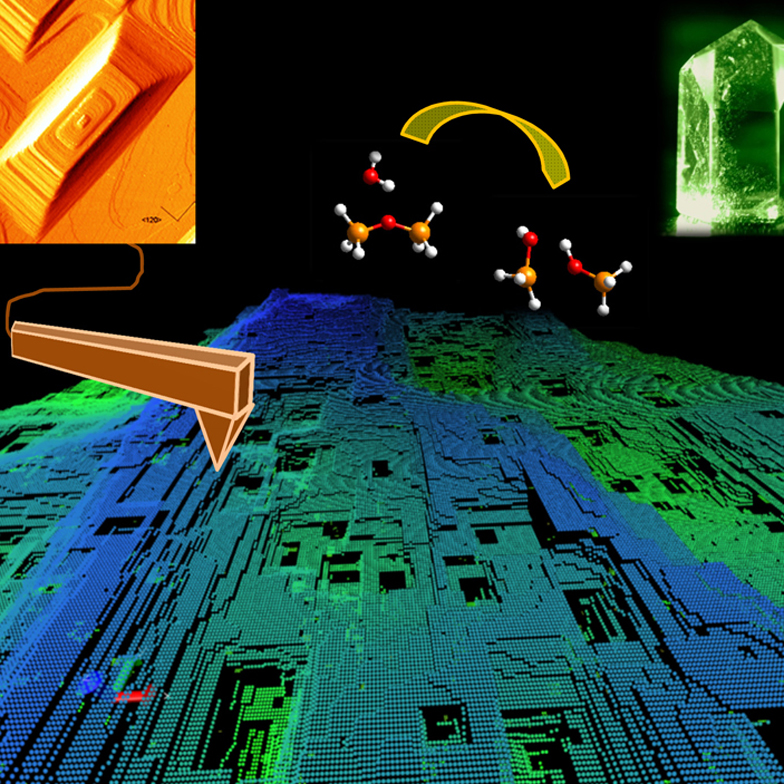Earth Materials (EM)
The Earth Materials specialization focuses on the formation and alteration of minerals and rocks, including exploration of mineral resources and their industrial applications. This specialisation provides deep insight and hands-on training in analytical methods widely used for characterizing the crystallographic, chemical and physical properties of minerals and rocks. Students explore fundamental mechanisms of mineral and rock forming processes, fluid-solid interaction mechanisms, alteration and weathering processes, rock deformation behaviour and quantify these processes with theoretical modelling and computer simulations.
Information: Prof. Sergey Churakov (Bern) or Prof. Esther Schwarzenbach (Fribourg)
» Material science, mineralogy & crystallography
» Mineral & rock processing technologies
» Zeolites, clays cement & ceramics
» Physico-chemical aspects of mineral genesis and reactivity
» Fundamental aspects of minerals stability and chemical
bonding

The curriculum of the Specialization in Earth Materials is bridging the field of geology and materials science. This Specialization provides students with the theoretical knowledge and practical laboratory skills required to address the main challenges facing professional geoscientists today.
Contemporary geoscience has an essential role in promoting a sustainable use of natural resources, implementing realistic energy transition scenarios and developing climate change mitigation options. These are the types of application the students are trained to address. This Specialization puts emphasis on the quantitative analysis of minerals and rocks, and the use of such data for numerical modelling of field and laboratory observations. Students receive hands-on training in the chemical characterization of minerals and rocks (e.g., electron microscopy, wet chemical and isotope analysis, IR/Raman spectroscopy), structural characterization of bulk mineral structure and their surface properties (e.g., X-ray methods, atomic force microscopy, and thermogravimetric analysis), and petrophysical characterization of rocks (e.g., deformation and porosimetry). Students learn the basics of numerical modelling of coupled mass transport widely used for interpretation of past and future evolution scenarios of the geochemical systems.
The master topics include investigations of CO2 sequestration options, exploration of geothermal energy reservoirs, studies of hydrothermal alteration processes, studies on mountain building processes, industrial use of secondary mineral resources, and geological disposal of nuclear waste. Other studies handle fundamental scientific questions such as fluid-mineral interaction mechanisms, climate change impact, global geochemical cycles, isotope fractionation processes, and interpretation of paleo-proxies.
Earth Materials is a large sector of professional activity for geoscience graduates with job opportunities in industry and national research centers dealing with refractories, glass, cement, clays, gem stones, or other solids of technological importance for industrial application. In addition to this specialization, master students are also encouraged to develop fundamental knowledge for general geological tasks and will be equipped for PhD studies and advanced academic careers at universities or research institutions. Experts are sought in fields such as general and applied mineralogy and petrology, material sciences (development of functional materials, industrial synthesis and material quality control). The spectrum summarized in Earth Materials spans from structure and properties of minerals to genesis of magmatic and metamorphic rocks. Multidisciplinarity within the domains geology-physics-chemistry provides students with skills to deal with technological applications of minerals and rocks. Many graduates of the Universities of Fribourg and Bern are currently working in one of these fields in the private, public, or academic sector in Switzerland and abroad.
The intention of this Specialization aims to provide skills for investigating and characterizing minerals, rocks, and other crystalline solids, with special emphasis on their properties. This also includes developing models on formation and stability of rocks and minerals, synthesis of corresponding materials under laboratory conditions, and testing possible applications in technology and ecology.
The intention of this Specialization aims to provide skills for investigating and characterizing minerals, rocks, and other crystalline solids, with special emphasis on their chemical and physical properties. This also includes developing numerical models describing the formation and stability of rocks and minerals, synthesis of corresponding materials under laboratory conditions, and testing possible applications in technology and ecology. The program is enriched with courses on computer simulations of geochemical processes and geostatistical analysis. Skills in state-of-the-art field and laboratory methods; integrating scientific information into sound petrological and mineralogical models; ability to formulate and execute a research project; communication of data and results in a professional manner, both in written and oral form; skills in efficient collaboration with colleagues.
(30 ECTS in Module B)
Download list with EM master courses sorted by frequency (pdf)
MSc projects may include a large variety of laboratory analyses of both fluids and solids, mineral surface- to field-scale modelling, experiments in the laboratory and in underground field laboratories, and field work. Please see the list of currently available topics. Students may also inquire with instructors directly about any additional thesis topics that may be available.
(this list is updated in January each year)
MSc students have access to a wide range of modern analytical facilities, including single-crystal X-ray equipment enabling structural characterization at high and low temperature (100 to 850 K), powder X-ray diffraction equipment for structural characterization up to 1400 K, petrographic microscopy, cathode-luminescence, scanning-electron microscopy, X-ray diffraction, electron microprobe, computer X-ray tomography, Laser-Raman and FTIR spectroscopy, Laser-ablation-ICP-MS, fluid inclusion microthermometry, rock porosity and permeability apparatus, wet-chemical laboratories with mass and optical emission spectrometers, ion chromatography, and stable and radiogenic isotope sample preparation and measurement facilities. A variety of experimental apparatus for Earth’s surface to hydrothermal temperature conditions are available (batch, mixed-flow, columns, autoclaves, etc). Computational facilities include computer clusters for geochemical modelling and GIS applications. Additional facilities as needed are available at the BeFri partner universities and at collaborating research institutes.
Teaching of the specialised courses on Earth Materials and supervision of MSc thesis projects is carried out by a team with extensive experience in applied and general mineralogy and petrology.